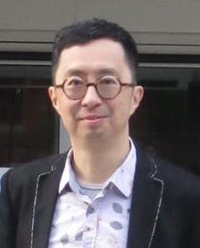


Ph.D., University of Cambridge (Oriental Studies)
M.Phil., University of Cambridge (Oriental Studies)
PGDE, Nanyang Technological University (Education)
B.A., National Taiwan University (Chinese Literature)
Email: shlim@cuhk.edu.hk | Tel: 3943-9872 | Office: KKB 213
Song Hwee LIM received his MPhil and PhD from the University of Cambridge. He taught at the universities of Leeds and Exeter for over twelve years before joining The Chinese University of Hong Kong (CUHK) in January 2014. Lim is the recipient of a CUHK Research Excellence Award in 2016/17. His latest book manuscript, Taiwan New Cinema as Soft Power: Authorship, Transnationality, Historiography, is currently under review at a prestigious university press, and its research was funded by a General Research Fund (2015/16) awarded by the Hong Kong governmen't's Research Grants Council.
Lim is the author of four books (two single-authored, two co-edited) whose pioneering research on slow cinema, world cinema, and queer cinema has opened up new areas of critical inquiry. His first monograph, Celluloid Comrades: Representations of Male Homosexuality in Contemporary Chinese Cinemas (2006), has been praised as “an exemplar of quality scholarship”, “thoughtful, rigorous, and challenging”, and “significantly rais[ing] the bar for future studies on Chinese cinemas and sexualities”. A Chinese translation of the book is currently under planning. His second book, Tsai Ming-liang and a Cinema of Slowness (2014), has been hailed as a “magisterial study” and “remarkable”, an “indispensable contribution to modern film scholarship” and “to the development of ‘slow cinema studies' as an academic subfield”. It has been translated into Chinese.
As founding editor of the international peer-reviewed Journal of Chinese Cinemas, (published since 2007), Lim has been instrumental in establishing the study of Chinese cinemas as an academic subfield. His two co-edited books, The Chinese Cinema Book (2011; second and expanded edition 2019/20) and Remapping World Cinema: Identity, Culture and Politics in Film (2006), have been widely adopted on film courses in Anglophone universities.
Lim has also played a leading role in fostering international research collaboration. He was the Principal Investigator of an international networks project funded by the Leverhulme Trust (UK) between 2012 and 2013. At CUHK, he has been founding director of the Centre for Cultural Studies since 2014. Between 2016-18, he was a steering committee member of an Arts and Humanities Research Council (UK) international network project on “Soft Power, Cinema and the BRICS”. He has held visiting fellowships at Academia Sinica (Taiwan), Free University Berlin, National Chiao Tung University (Taiwan), National University of Singapore, and Clare Hall, Cambridge, and has delivered keynote lectures in Australia, Britain, and China. He is also Honorary University Fellow at the University of Exeter.
Lim's research and teaching interests encompass many areas of film and cultural studies, including transnational Chinese cinemas, gender and sexuality studies, postcolonial and diaspora studies, critical theory, as well as questions of time, space, and identity. He has supervised PhD dissertations on East Asian (including Japanese and Korean) cinemas, queer cinema, Taiwanese literature, and PRC documentaries.
Major Publications
Lim, Song Hwee. Tsai Ming-liang and a Cinema of Slowness. Honolulu: University of Hawaii Press, 2014.
_____. Celluloid Comrades: Representations of Male Homosexuality in Contemporary Chinese Cinemas. Honolulu: University of Hawaii Press, 2006.
_____ and Julian Ward (eds.). The Chinese Cinema Book. London: BFI Publishing, and Basingstoke, Hampshire: Palgrave Macmillan, 2011.
_____ and Stephanie Dennison (eds.). Remapping World Cinema: Identity, Culture and Politics in Film. London and New York: Wallflower Press, 2006.
Recent and forthcoming publications
Lim, Song Hwee. “Concepts of Transnational Cinema Revisited”, Transnational Screens, vol. 10, no. 1 (forthcoming Spring 2019).
_____. “Citizen-to-citizen Connectivity and Soft Power: The Appropriation of Subcultures in ‘Little Freshness' Across the Taiwan Strait”, China Information, vol. 33, no. 3 (forthcoming November 2019). Advanced publication online.
_____. “Towards a Poor Cinema: Ubiquitous Trafficking and Poverty as Problematic in Midi Z's Films”, Transnational Cinemas, vol. 9, no. 2 (2018): 131-146.
_____. “Walking in the City, Slowly: Spectacular Temporal Practices in Tsai Ming-liang's ‘Slow Walk, Long March' Series”, Screen, vol. 58, no. 2 (2017): 180-196.
_____. “Can Poetics Break Bricks?”, in Gary Bettinson and James Udden (eds.), The Poetics of Chinese Cinema. Basingstoke, Hampshire: Palgrave Macmillan, 2016, pp. 147-165.